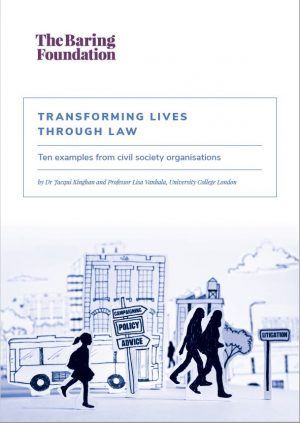This is one of 10 articles in our publication Transforming Lives through Law which looked at how civil society organisations in a wide range of sectors use legal tools and tactics to secure change.
Some women who live in the UK are more vulnerable to abuse and less likely to be able to access support, advocacy and criminal justice measures as a result of their immigration status. The UK has signed the Council of Europe’s Istanbul Convention against Violence against Women and Domestic Violence, which requires that female victims of violence are protected regardless of their immigration status. However, the spouses of refugees entering the UK were not able to rely on provisions for victims of domestic violence if they separated from an abusive partner in the same way that the spouse of a British citizen or person with settled status could.
A 2016 Scottish case, A v Secretary of State for the Home Department, sought to challenge this framework on behalf of the spouse of a Ugandan refugee who had left her marriage because of domestic violence. The case was a success, with the court finding that a decision made under the rule by the Home Office amounted to unlawful discrimination.
It nonetheless took several years of dedicated engagement by civil society organisations together with the Equality and Human Rights Commission (EHRC), including an influential campaign run by the charity JustRight Scotland, to embed the court’s decision and for the Home Office to make the necessary rule change. The issue at the heart of the initial legal case was a UK wide problem that came to the attention of law centre solicitors at the Legal Services Agency, Kirsty Thomson and Sarah Crawford (now of JustRight Scotland) when an existing client was unable to access domestic violence protection because of her immigration status. There was no doubt in the mind of the lawyers involved that it was an important strategic issue that could potentially impact upon many other women in the same position.
Jen Ang, Director of JustRight Scotland, notes, “it was a compelling strategic case because it was a discrete group, there was more than one area of law in play and it raised human rights arguments.” Once the appeal reached the Court of Session the issues “had sufficiently narrowed,” making it an ideal case where the EHRC could make a contribution by way of written third party intervention. Jen highlights that having a strong relationship with the EHRC was helpful in terms of advancing the case, as it contributed important legal insights and informed the court about the UK’s international human rights obligations.
An existing client had the issue, it came to us quite naturally in a sense that the case highlighted a gap. We ran a specialist service and we were always looking at the gaps and we were always looking at these sorts of cases.
The case was a success with the most straightforward impact being that pre-flight spouses of refugees who have separated from their abusive partners could potentially apply for settlement. However, two key barriers prevented this impact materialising on the ground.
The first was that the Home Office showed no signs of an intention to change the rules in line with the judgment and second, it was difficult to raise awareness of the change among individuals and organisations working in the field. Jen confirms that “the Home Office often just don’t respond for some time… because they hadn’t changed the rules and because other NGOs were so limited in their capacity to raise awareness of the case.”
Although the change should have been a straightforward application of the judgment in practice, Jen notes that because there hadn’t been a change to the Immigration Rules “people didn’t think they were eligible and lawyers were also deterred from relying on it.”
Meanwhile, the EHRC began to seek an amendment to the rules. The legal team in Scotland worked together with policy colleagues in England and Wales to try and raise the issue with the Home Office, eventually making formal representations at a meeting with the then Home Secretary Amber Rudd in December 2017. The EHRC again highlighted the problem in their response to the consultation on the Domestic Abuse Bill in May 2018, some two years after the court decision. A few months later, JustRight Scotland proposed an awareness-raising campaign that would run around the sixteen days of action against violence against women from November 2018.
An EHRC lawyer, Frank Jarvis, wrote an article highlighting the ongoing problems presented by the policy loophole which appeared both in the EHRC’s Equality Law bulletin and also on the Free Movement website (which has around two and a half million views per year).
At the same time, JustRight Scotland engaged in communications widely across social media and in the national press. The campaign, alongside the policy engagement by the EHRC, eventually led to changes to expand the domestic violence rules to the spouses of refugees in compliance with the judgment. These were announced by the Home Office on 11 December 2018, a short time after the campaign launched. Jen believes this to be an important example of “the power the EHRC holds in implementation” in their role as a regulator.
[This case] provides an important example of the time and effort needed to embed even a successful decision by the courts.
While there is still some ongoing work to be done in ensuring widespread awareness of the change, it provides an important example of the time and effort needed to embed even a successful decision by the courts. It also demonstrates the impact that organisations such as the EHRC can have working together towards the same goals as their civil society partners.
